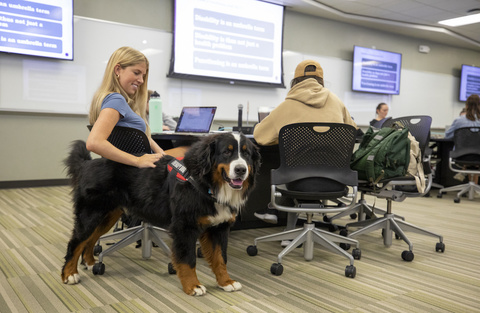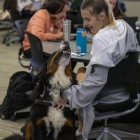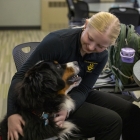By Charlotte Brookins
The therapeutic recreation and child life programs in the College of Liberal Arts and Sciences recently welcomed a new staff member — a Bernese mountain dog named Drax.

Drax is now the second therapy dog on campus and joins Wilkie, a wheaten terrier and poodle mix. But whereas Wilkie works primarily to support students navigating mental health concerns, Drax serves a role both in and out of the classroom.
Adrienne Johnson, associate professor of instruction and internship coordinator for therapeutic recreation in the college’s Department of Health and Human Physiology (HHP), had the idea to bring Drax to the university. She is also Drax’s handler.
“I saw more and more therapy animals being used in the fields of therapeutic recreation and child life, and clients' mental health was improving as a result,” says Johnson on how she decided to bring Drax into the classroom.
“My husband and I had been talking about adding a dog to our household and then bringing that therapy animal onto campus not only as an aide for higher education but also to improve student retention and mental health,” Johnson added.
Therapy dogs are known to provide many benefits to college students, such as helping decrease stress and anxiety, increasing social interaction, reducing loneliness, and more.
Over the past few months, Drax has been accompanying Johnson to her animal assisted therapy first year seminar, where he has served as a specific example of therapy animals and their work in the field. In addition to his help with teaching, Drax helps create a friendlier and more approachable learning environment for students.

Students can also reach Drax during his weekly office hours to get one-on-one time with him outside of class time. He’s there to help reinforce ideas learned in class but also as a friendly face for students to visit throughout the day.
Many of Johnson’s students have expressed enthusiasm for the new figure in the classroom.
“I grew up with a family dog and recently lost him last year,” says Juliette Joyaux, a junior majoring in therapeutic recreation for pre-child life in CLAS. “Getting to go to a classroom where there’s an animal, especially one as sweet as Drax, makes attending school and doing work so much easier.”
Joyaux added how Drax always puts a smile on her face.
Johnson says she received support and enthusiasm from university administration, the college and the department to bring Drax on board.
“Once I put together a proposal, my department helped with editing that and sending it out to the deans,” explains Johnson. “They were careful to view the proposal from student safety and concerns, as well as health and wellbeing of the animal.”
Although Drax had no personal comments during the interview, Johnson confirms he has greatly enjoyed working with the students, faculty, and staff on campus.
For more information on Drax and his office hours, visit the Health and Human Physiology website.
Photos taken by Alice Eberhart

|

|

|

|

|

|